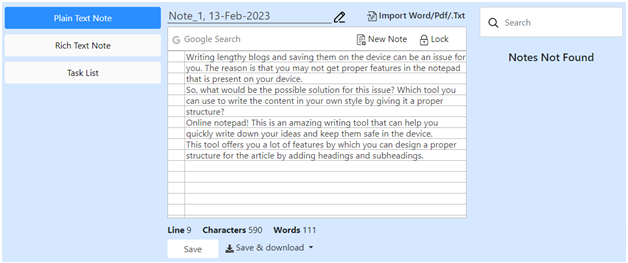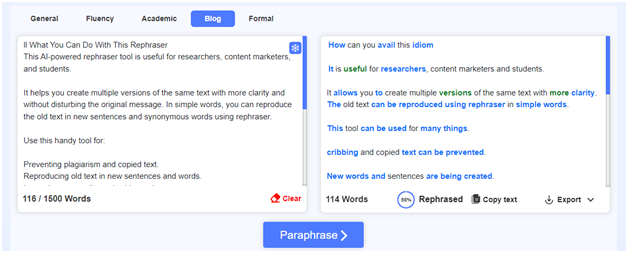
Search engine optimization is very important if you want to see your blog in the top ranks.
Without SEO, there is no way you can beat your competitors and make space on the higher SERPs or get organic traffic on your blog.
Here in this article, we have discussed some of the best techniques to help you write SEO-optimized blog posts that will surely get millions of visitors and a good position in the search results.
You must understand that without optimizing your blog content according to the requirements of the search engine, you can never make it successful.
Here we have summarized some reasons why it is important to write SEO-optimized content:
- SEO-optimized content can help you get your blog index faster on Google
- You can easily drive more organic traffic toward your site with SEO-optimized posts
- Seo writing can help you build authority in the niche you are targeting
- With SEO writing, you can also monetize your blog and generate a passive income
- You can easily take your blog site to the top search results with SEO-optimized content
Other than these benefits, there are many more you should know about.
With that said, let us know to dig into the details of the top techniques for writing the most valuable blog posts.
Brilliant Writing Tips for Creating SEO-Friendly Blog Articles
In this section, we have discussed a few valuable tips that can help you write a valuable blog post:
1. Do Research Before You Write an Article
Before you start writing, it is important that you think about what you have to write.
Gone are the days when generic articles were considered to be valuable.
Today if you write generic articles, they are not going to have any kind of value in the eyes of the search engine or the target audience.
The best article is the one that is informative and entertaining at the same time.
You have to find out what your target audience is searching for and try to write a post that provides them with solutions for their queries.
If your post satisfies the search intent of the target audience, you can easily win higher-ranking positions in a very short time.
During the research phase, you have to select the topic of your post, and you also have to understand how your post/topic would benefit your readers.
2. Find Related Keywords and Semantics
Keywords are very important in SEO content writing.
Without keywords, your article would have no value in the eyes of the search engine.
Keywords help Google, and other search engines understand the topic and intent of your posts.
This is why it is important that you use the most relevant and highly searched keywords in your posts.
You can use online keyword suggestion tools and find the best keywords related to your post.
The more searched keywords you use, the more traffic you will be able to drive to your posts.
The online keyword finder tools are available for free, so you don’t have to worry about any added cost.
3. Create a Simple Structure and Outline
Once you are done with the research, you have to create an outline that will help you write with a proper flow.
The purpose of the structure is to divide the blog post into multiple small sections.
Today readers visiting your blog are not interested in reading large chunks of text.
SEO experts recommend that you must divide your post into multiple headings.
Each heading must not have more than 200 words or so.
An SEO-optimized blog post is usually divided into three main sections.
These include the introduction, main body, and conclusion.
You can further divide these sections into multiple headers and subheadings.
Dividing your post into sections would make it digestible for the readers.
To add all these aspects to your post you can use a reliable notepad tool like online-notepad.net.
This online notepad’s rich text mode has all the features that are required to give a proper structure to the blog post.
The tool also lets you download your text into word, pdf, or txt files.
4. Use Relevant Headings & Subheadings
Using headings and subheadings is very important in SEO writing.
It would not be wrong to say that without proper headlines, your article would have no value because it would not be engaging.
The headlines you add to your content must always be relevant to the topic of your post.
Moreover, the heading must inform the reader about the information they are going to find in that specific section.
Another wise move would be to add your target keywords in the headings and subheadings.
This would help the search engine understand what your post is about.
5. Optimize the Length of Your Blog Posts
Word count is another SEO ranking factor that one should focus on.
When you are writing a blog post, you have to make sure that you write at least three to four hundred words.
Content that has fewer than 300 words is flagged as thin content by Google.
This kind of content has no value in the eyes of the search engine or the reader.
Also, know that increasing the length of your posts can also scare away readers and increase the bounce rate of your blog site.
The ideal length of a blog post is 1000 to 2000 words.
To check the word count of your blog post you can use an online word counter tool.
You can also check the keyword density in this tool.
Which can help you to prevent your blog post from keyword stuffing.
You can increase and decrease the word count limit on the basis of information you have related to the topic.
6. Check Posts for Human Errors & Plagiarism
When you have completed the writing process, you have to let other people read your post so that they can highlight any missing information or human errors in the post.
You can also use online readability checker tools to make sure that your text has no spelling, grammar, or punctuation errors in it.
Other than checking your work for petty mistakes, you must also use an online plagiarism checker to ensure that your content is free of duplication.
Google will not rank your blog post on the top SERPs if it has human errors or plagiarism in it.
This is why you need to use the most reliable tools and spend ample time proofreading.
7. Use Online Rephraser to Optimize Text Quality
If you don’t have expert content writing skills and have found errors in your draft, then there is no need to panic.
You don’t have to hire a professional writer or editor to improve the quality of your blog posts; rather, you can use a reliable paraphrasing tool like Rephraser.co to improve text quality.
The rephrase.co uses advanced AI-powered bots to understand the main idea of your text and would generate a new version without compromising the actual intent of your draft.
All you have to do is to upload your text in the input section of the tool, select the BLOG mode, and click on the “Paraphrase” button.
By using the blog mode, you would be able to rewrite every sentence without compromising the keywords or the original idea of your post.
The text rephrased by this tool would be free of all kinds of human errors and plagiarism.
The text generated by this sentence rephrase tool is close to a human-written draft which is why it is quite famous among bloggers.
You can also use this sentence rephrasing tool to remove duplication highlighted by a plagiarism-checking tool.
Final Words
In this guide post, we have discussed seven authentic tips and tricks using which you can easily optimize your blog posts according to the requirements of the search engine.
The online paraphrasing tool is a very valuable resource for bloggers as it doesn’t only help you improve the quality of your drafts but also helps you remove duplicates from your posts.
You can easily save time, effort, and resources by taking help from the online paraphrase tool.
You might also like our TUTEZONE section which contains exclusive tutorials on making your life simpler by using technology.






